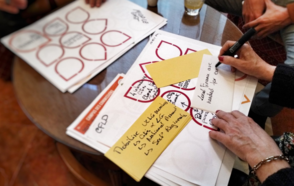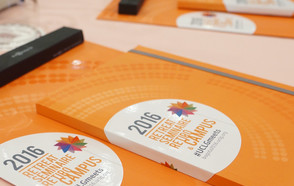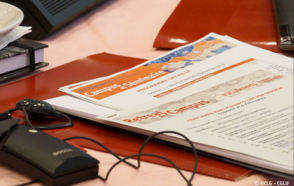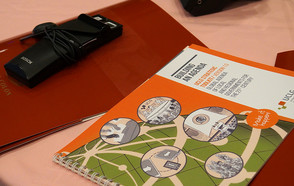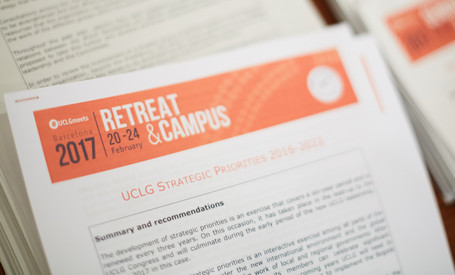
Read the full report of the 2017 edition of the Annual UCLG Retreat and Campus
The third edition of the Annual Retreat & Campus is taking place in Barcelona, the home of the organization’s World Secretariat, from 20 to 24 February 2017.
The retreat is the occasion to harness the power of our network and continue our work based on the collaboration and achievements of the last few years, as well as increase visibility and impact at all levels.
Under the theme "From policy development to implementation" this year´s programme includes the Presidency meeting on 20 February to define the key priorities and commitments for 2017. On 21 February the Global Taskforce will meet to discuss the future of the World Assembly and the localization of the Global Agendas.
On Wednesday and Thursday 22-23 February it is expected that our network will define our strategy Local Action 2030 beyond Habitat III, including a presentation of the UCLG Learning and Observatories workplan. The Annual Retreat and Campus will finalize on Friday 24 February with a session on communication and awareness raising.
Social Share: #UCLGMeets
- Follow #UCLGMeets
- Check out our Storify Day 1 / Day 2 / Day 3 / Day 4 / Day 5
- Visit our album in Flickr Day 1 / Day 2 / Day 3 / Day 4 / Day 5
Programme of the UCLG Annual Retreat and Campus
 Day 1: 20.02.2017 – Presidency Meeting
Day 1: 20.02.2017 – Presidency Meeting
 Day 2: 21.02.2017 – Global Taskforce Meeting
Day 2: 21.02.2017 – Global Taskforce Meeting
 Day 3: 22.02.2017 – UCLG Strategy beyond Habitat III
Day 3: 22.02.2017 – UCLG Strategy beyond Habitat III
 Day 4: 23.02.2017 – UCLG Learning and Observatories work plan
Day 4: 23.02.2017 – UCLG Learning and Observatories work plan
 Day 5: 24.02.2017 – “Co-creating” our communication and advocacy strategy
Day 5: 24.02.2017 – “Co-creating” our communication and advocacy strategy
Day 1: 20.02.2017- The UCLG Retreat and Campus kicks off with the Precidency Meeting
The City Council of Barcelona hosted the political leadership of UCLG on the first day of the annual Retreat. The aim of this first day dedicated to a gathering of the new selected Presidency of the organization was to define the priorities for 2017, discuss key commitments and strenght the cooperation as a global network.
Local leaders thanked Mayor of Barcelona, Ada Colau, for hosting this meeting of the UCLG Presidency at Barcelona city Hall. All the attendees expressed their gratitude to UCLG for having unified local voices globally and for the recent recognition of local and regional governments key role in the implementation of the Global Agendas for sustainability: Habitat III and the Agenda 2030. 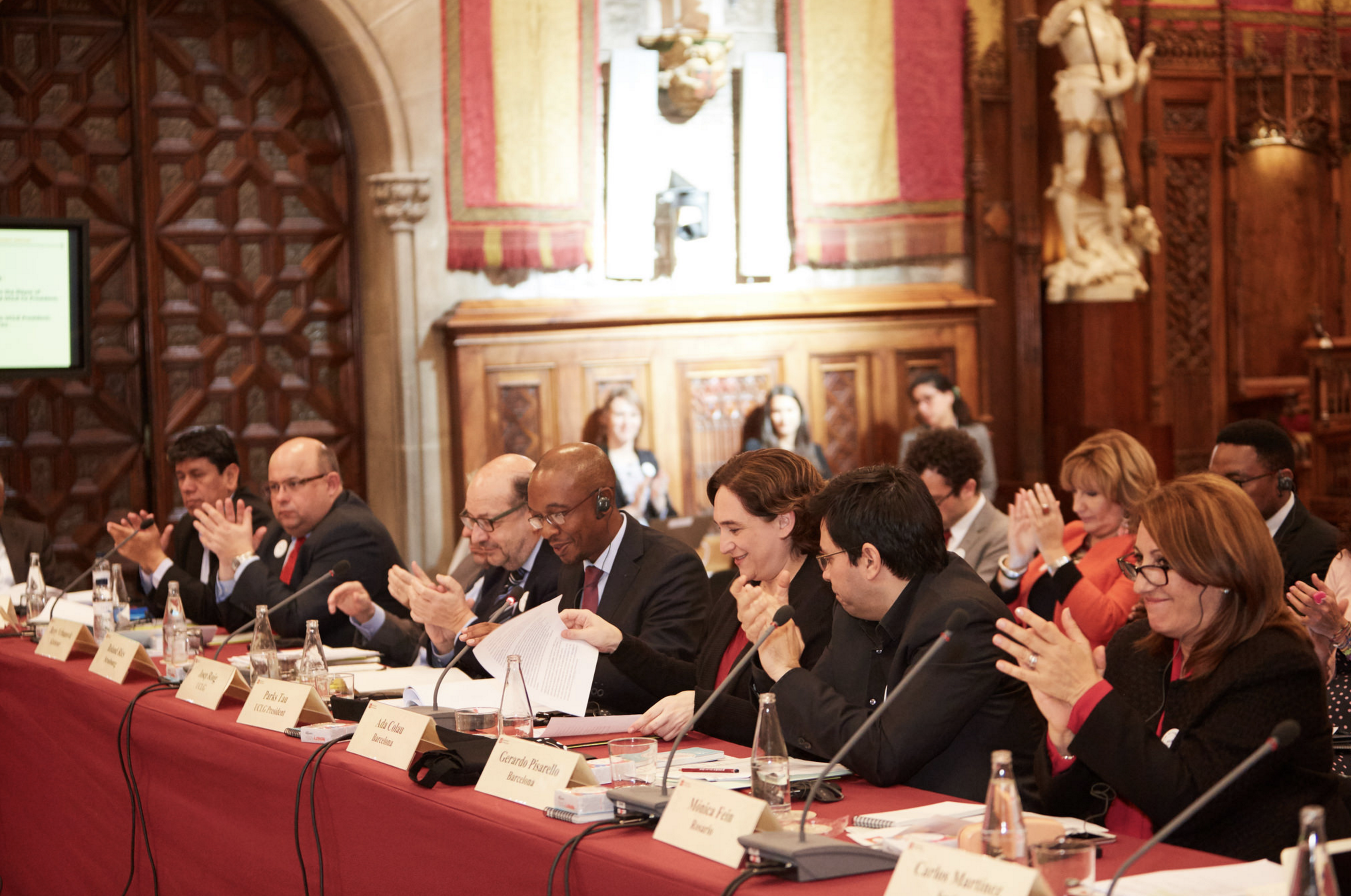
Today´s meeting has been the first opportunity that the recent elected Presidency had to discuss the priorities of the organization. Regarding the future strategy of our organization, participants agreed 2017 will be a landmark moment as we enter in the implementation stage of the recent adopted agendas for sustainability. In this sense, the debate led to the conclusion that we, as a global network, need to focus in three main aspects for the implementation: governance, resources and partnerships. The political leadership of UCLG stated that the Strategic priorities of UCLG for the future need to emphasize the who and how to face the main global challenges and that the Retreat will be the perfect work space in this regard.
The session highlighted that the localization of the agenda is a bottom-up political process and not about parachiting global agendas into local territories. The achievement of the major global agendas must be based on local priorities and "this is how UCLG understands localization", stated UCLG President, Parks Tau.
The challenges of migration, climate change, gender equality, the need to recognize a seat at the global table for our constituency and the financing of development were some of the priorities emerged for the implementation.

Tomorrow, the second day of the Retreat will be dedicated to a meeting of the Global Taskforce and how to move towards the implementation of the agenda. Stay tunned to the conversation of tomorrow with #UCLGMeets and #Listen2Cities.
Day 2: 21.02.2017 - The meeting of the Gloabal Taskforce analyzes our contributions to the Global Agendas
Day two of the UCLG Retreat and Campus kicked off by recalling local and regional government contributions to recent global sustainability agendas. This day brought together the local and regional networks of the Global Taskforce (GTF), as well as numerous partners that have accompanied us on the road towards the adoption of the Sustainable Development Goals (SDGs), the Paris agreement and the New Urban Agenda.
Participants agreed that the World Assembly of Local and Regional Governments in Quito was remarkable and that it would not have been possible without the networks of the Global Taskforce and the support of partners.

The day covered the follow-up and implementation of the Habitat III Agenda, localizing the 2030 Agenda, financing, and the climate agenda towards COP 23 and beyond.
The first roundtable dedicated to the implementation of the New Urban Agenda (NUA) analyzed with partners how a multi-stakeholder approach is needed for implementation. Rosario Bento Pais, from the European Commission, explained that “the European Union believes that the local authorities in urban areas have a decisive role to play to achieve basic education and basic services at local levels”. Günter Meinert from GIZ added that “local governments are needed to define the real progress of the NUA to leave no one behind” as well as to engage with citizens in this process. Participants agreed that we need an enhanced partnership between local governments (large and small) and the international community, characterized by inclusive consultation and decision-making.
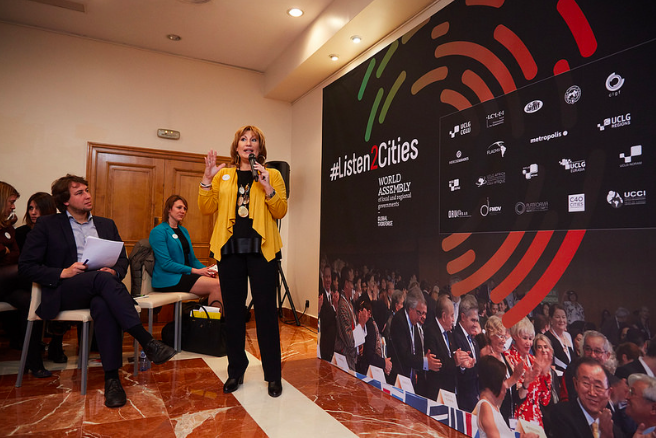 In the second roundtable, united by the growing consensus that it is by focusing on the local level that we can achieve the SDGs globally, local networks of the Global Taskforce highlighted that so-called “localization” is a bottom-up, rather than a top down process. The UCLG President, Parks Tau, argued that “localizing involves the implementation of local agendas in cities and territories to reach both local and global goals”.
In the second roundtable, united by the growing consensus that it is by focusing on the local level that we can achieve the SDGs globally, local networks of the Global Taskforce highlighted that so-called “localization” is a bottom-up, rather than a top down process. The UCLG President, Parks Tau, argued that “localizing involves the implementation of local agendas in cities and territories to reach both local and global goals”.
The next roundtable was dedicated to financing the implementation of global agendas. Access to finance and resource mobilization are at the center of the debate. Financing is important for networks of local governments to ensure that the means for implementation are available.
The climate agenda towards COP 23 was the topic of the fourth roundtable, where local networks presented the results of COP 21 and COP 22 and the next steps for COP 23 and the International Panel on Climate Change. The session highlighted that climate change is linked to all global agendas for sustainable development, including the SDGs.
Day 3: 22.02.2017 - The third day of our Retreat seeks to define our local action 2030 beyond Habitat III
Day three of the UCLG Retreat began with discussion to shape our strategy to develop local action for the 2030 and Habitat III agendas. The energy and participation of previous days stayed strong, with the morning dedicated to a round table on political priorities. Two spheres of being part of UCLG were identified, first the importance of the diversity of the network, and second, the difference between political representation and learning from technical spheres of local and regional institutions.
In the afternoon, UCLG sections from Africa, Asia Pacific, Eurasia, Europe, Latin America, the Middle East, West Asia, North America, large Metropolises and Regions presented their priorities. Prominent issues included gender equality, disaster response, risk reduction, migration and refugees, climate change adaptation and response, the proximity to citizens and the localization of the Sustainable Development Goals.

The need for knowledge sharing, training and learning as essential to shape the future we want as well as advocacy for the role of local and regional governments internationally were also echoed around the room.
The day continued by work to identify what we are missing as global network to enrich the work plan for 2017 and beyond. Factors identified included: alliances between the actions of different parts of the network, in line with the goals set out by the governing bodies.
Day 4: 23.02.2017 - The four day revises and denfines de UCLG Learning Agenda and Observatories work plan
Day four of the Retreat was dedicated to Learning Exchange within the network and to follow-up and reporting on the Global Agendas.
Our learning agenda aims to make UCLG a true learning network. During the morning session, participants exchanged information on how to integrate learning into our strategy for the next period, as it is part of the main political output of the last World Summit of Local and Regional Leaders The Bogota Commitment.
Consider the urban space as a learning space that guarantees the free movement of knowledge, using open and free licenses”
The Bogota Commitment and Action Agenda
Participants considered the following questions relating to integrating learning into the overall UCLG strategy: “How can we coordinate our efforts towards synchronized learning outcomes, practices and actions?” and “how can / would you contribute to successfully connect learning to the localizing SDGs dimensions?”
UCLG observatories: follow-up and monitoring of the global agendas implementation at local level
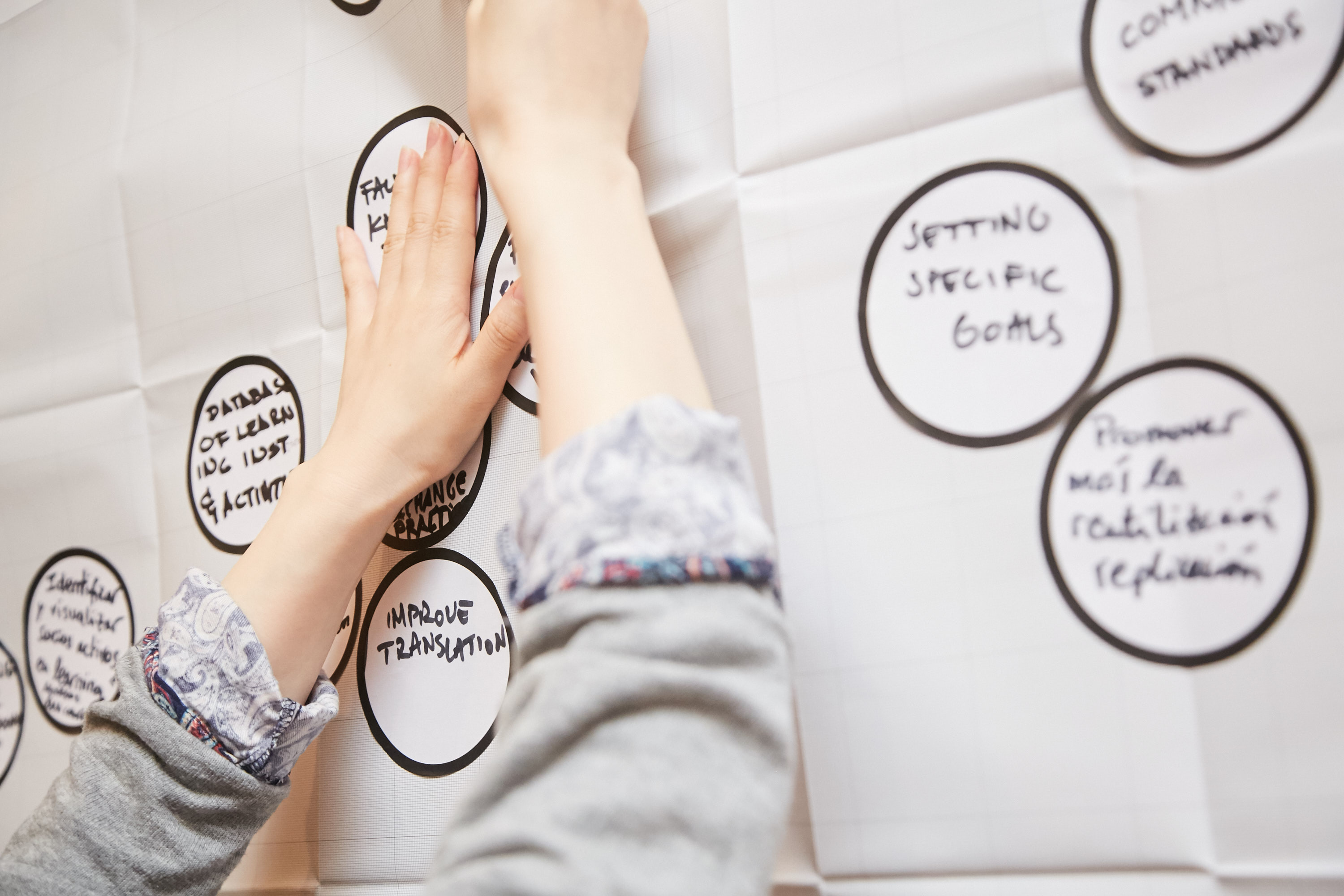
The global agendas for sustainability (financing for development, the climate agenda, the Sendai Framework for Disaster Risk Reduction, the 2030 Agenda and the New Urban Agenda), require the contributions of local and regional governments. Participants in the afternoon session of the Retreat analyzed local and regional governments’ role in the monitoring of the agendas.
Different parts of the network presented observatories and innovative initiatives that are making local implementation possible, including the Observatory of Local Finances, the Inclusive Cities Observatory, the Latin American Observatory, and Metropolis’ policy transfer, among others.
Local and regional governments bring a perspective that no one else is bringing to these agendas, the so-called “localization” of the agendas. The second part of the session was dedicated to identifying synergies between Sections and Committees for Reporting and Monitoring involving the whole UCLG network.
Day 5: 24.02.2017 - "Co-creating" our communication and advocacy strategy
The last day of the UCLG Retreat was a fruitful morning dedicated to developing our communication and advocacy strategy for the implementation and local action of the network. The session opened with the idea that, for us, communication is a medium to learn, influence and monitor, as it goes beyond informing about what we are doing: “Communication is much more than a hashtag or an event”. 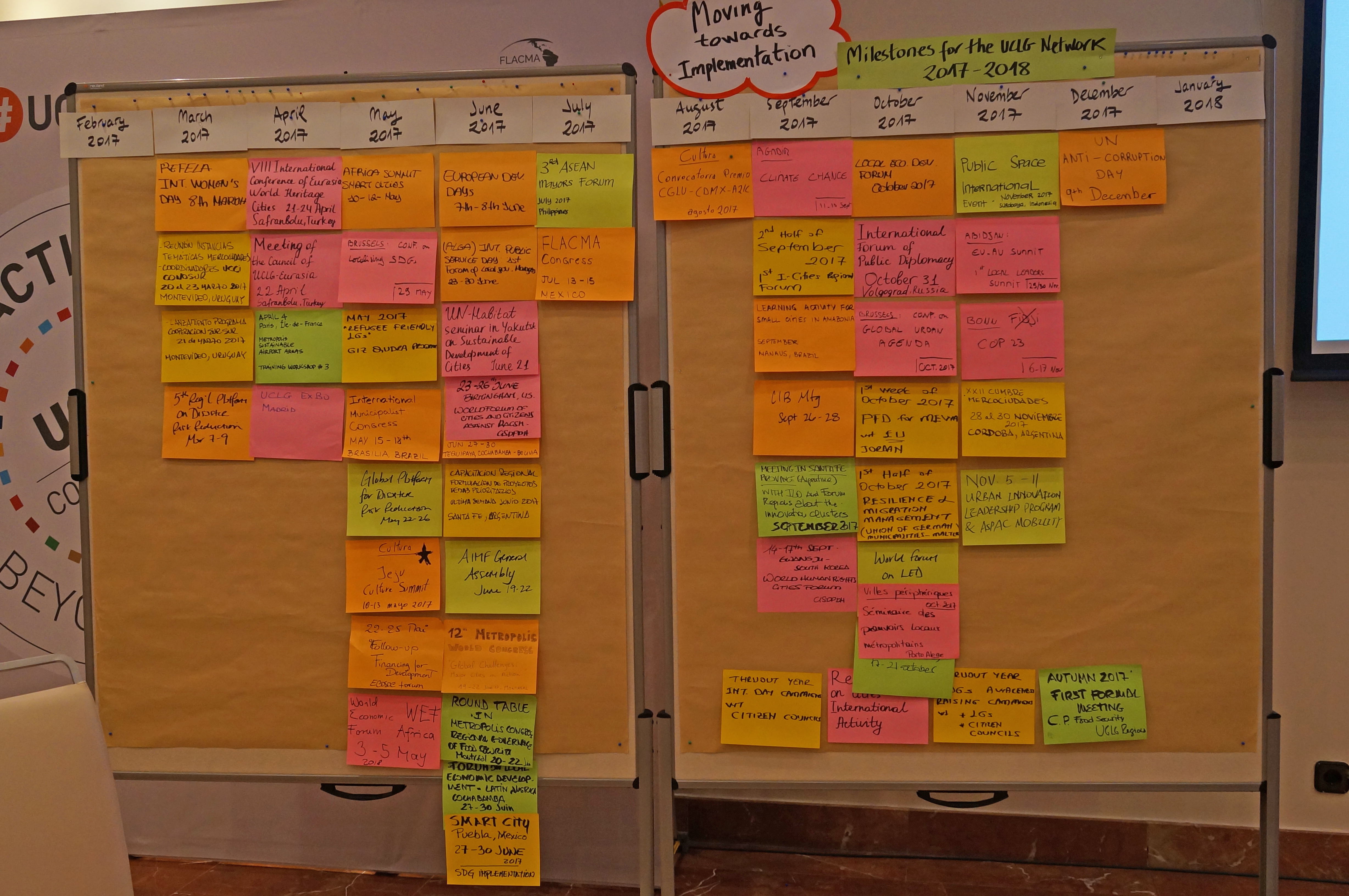
Participants debated how we can have greater influence if we all communicate as a network and everyone joins communication campaigns. The example of such a success was the #Listen2Cities campaign’s achievement of the recognition of the key role of local and regional governments in the New Urban Agenda.
Participants in the session put together a timeline of the main actions for the coming year, including the main events of Regional Sections and Committees. This enabled us to build a common strategy for the whole network.











